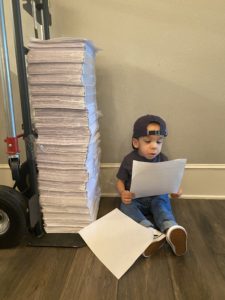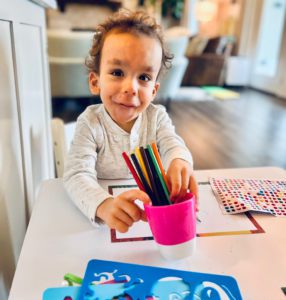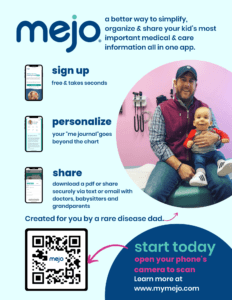Don’t forget to read Part 1 of our interview, where we discussed what Costello syndrome is, Ryan’s son Reynolds’ diagnosis, and what spurred the family to want to make a change.
mejo
Ryan has a background in the business world. So when he noticed the lack of resources or tools for caregivers of medically complex children and children with rare diseases, he thought that there had to be a better way to manage information than a difficult, unshareable EMR system.
At first, Ryan began building one-page documents which covered all of Reynolds’ conditions, medications, doctors, vitamins, and information about who Reynolds was as a person. He would take them to doctors’ offices and distribute them, and carried the one-pagers on vacation just in case anything happened.
During that time, Ryan also began receiving extremely positive feedback. He shares:
I had multiple doctors, therapy clinics, and families say, ‘Whoa, this is awesome. Where did you get this?’ It was flattering, but I also wondered how I could make it universal so that it could get into the hands of everyone who needed it.
Ryan created mejo as a startup. He first created a beta version where people could put in their info, print out a PDF, and then have the info disappear. However, feedback stated that the disappearing data made it harder on parents, who had to keep inputting it. So Ryan and co-founder Bret Koncak took another swing at it. Bret is not just an industry leader, but also a rare disease parent. Ryan says:
We’re trying to solve our daily lives to help the millions of other people who are going through this.
Now, parents can create profiles, input and save data with industry-standard security safeguards, and easily share information through text or email links. For example, if a babysitter is coming over to watch your child, you can send mejo for 8 hours. If you’re leaving your children with family during vacation, you can send mejo for days. Parents can also make different mejo profiles for each child, so the data is personalized on each profile.
Since launch around 8 weeks ago, hundreds of users have already registered.
Humanizing Medicine
One of the most impactful elements of mejo is its ability to humanize medical data. Of course, it captures medical data: medications, procedures, diet, therapy, blood type. All of these are crucial to disease and health management.
Ryan explains that in hospital settings, most children are considered to be their diagnosis. But these children are so much more than that. Says Ryan:
My son is non-verbal. He uses sign language and an AAC device. He didn’t walk until three but now he’s running and climbing. He does equestrian therapy with a big horse named Newt. He loves Blippi and giving high fives. So when a doctor gives my son a high five, or talks about Blippi, I can tell that the doctor read his mejo. And it makes Reynolds feel more at ease.
That’s why mejo allows parents to write a paragraph about their child to give physicians a picture of who the child is outside of just a diagnosis.

mejo: Looking Towards the Future
Right now, mejo is focusing on rare diseases and medically complex children. Ryan explains:
There are about 25-30 million children in the US who are designated as rare and/or complex. That number is shocking for a lot of people because it’s almost one-third of all kids. A lot of them don’t have parents with a healthcare background and parents are learning to navigate this all for themselves. The way mejo is taking off shows how much of a need this has been for years. For me, seeing its growth and hearing stories from parents has been the most rewarding part.
In the future, mejo does have plans to both roll out new features, create a bigger and more caregiver-centric platform, and offer help to those outside of the United States. Ryan also sees growth potential in terms of partnerships. For example, CSFN has partnered with mejo, and mejo will soon become an official tool for parents of children with Costello syndrome.
Final Advice
When asked about advice he would give to parents or families facing rare or medically complex diagnoses, Ryan shared what he calls the three As: ask questions, advocate, and adapt. He explains:
First, there are no silly questions in rare disease or medically complex children. You are your child’s only voice so if you come across a provider who doesn’t want to work with you, move on to a different provider. And adapt to the situation and to new diagnoses. I know that not all rare disease families have the opportunity to adapt because sometimes rare disease is terminal. But for us, we had to adapt and keep moving on. We have two other kids. We both have jobs and lives and hobbies. Reynolds is thriving and he will grow up to be a kid who can do more things. We know that there will be challenges down the road and things might pop up, but we’ll tackle that when the time comes.
Of course, Ryan says that he has not always held that perspective. But the rare disease community is a varied and supportive one, and learning about different situations or experiences can really alter the way we view things.

Ryan also advocates for caregivers to look for other avenues for support. He wants to remind parents that they are not alone and there are people who want to help. That it’s okay to take things one day at a time. Recently, he has connected with another rare disease father and they are starting a 5-person rare dad group. So consider looking for others in your community who are going through similar situations, and reach out to see what it can bring!
Finally, Ryan encourages people to start mejo as early as they can – to use it, fill it out, keep up with it, and always be prepared. In the end, he says:
I want people to know that I’m a dad and caregiver first. I want that to come across in every mejo idea and initiative – we’ve been there.







